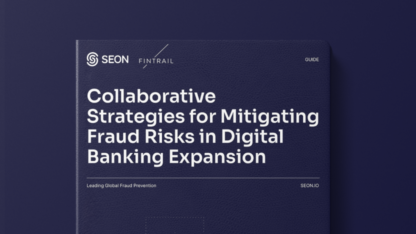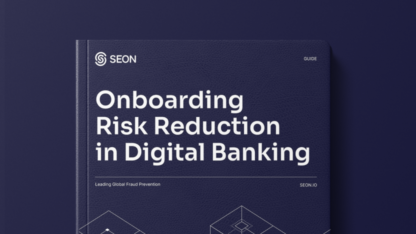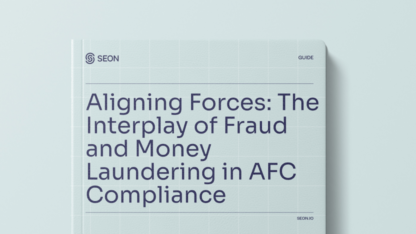Of all the innovations made possible by the internet, sometimes it seems like the most common is: What are innovative new ways to trick people into thinking they can Get Rich Quick™?
In the current financial ecosystem, this is very often seen in cryptocurrency and forex (FX) – foreign exchange – investments. The global forex market alone is estimated to have a total value of some $2.4 quadrillion dollars, a number that makes eyes light up regardless of persuasion, be it fintech professionals, casual investors looking to maximize their earnings, or, indeed, fraudsters.
With such a fat, juicy carrot dangling in front of internet users’ collective face, a diversity of fraud and scams are inevitable. Let’s take a look at some of the red flags and warning signs for fraud that exist inside this already risk-hungry industry.
What Is Forex Fraud?
Forex fraud is a blanket term to reference any fraudulent activity that occurs within the foreign exchange trading space. While there are many higher-profile examples of forex fraudsters using social engineering to operate large-scale scams, forex fraud is just as often as small and quiet as a compromised password and an account takeover.
The only thing all the tactics share under the umbrella of forex fraud will be the goal of separating unsuspecting people – or organizations – from their money. As well as the urgent need to prevent them.
Partner with SEON to reduce fraud rates in your business with real-time data enrichment, whitebox machine learning, and advanced APIs.
Ask an Expert
Why Do People Get Scammed With Forex?
FX trading has blossomed into a major industry in the online space and, by nature, comes with promises of profit – and risk. What’s more, regulation is ever-shifting and authorities are concerned about money laundering potential. As a result, it is a sector highly targeted by fraudsters and scammers.
To understand how unsuspecting internet users can let themselves be duped into handing over large sums of money, first let’s inspect what financial opportunities a legitimate forex transaction can offer.
As of the beginning of this year, the international volume of forex transactions averaged $6.6 trillion, daily. How does this $6.6 trillion pie get sliced up further in order to be distributed into investors’ wallets? In other words, under what pretense are scammers luring in their victims?
By and large, actual profits (often calculated in hypothetical market value) that are derived from the forex industry come in the form of:
- Derivatives and speculation, where trades are executed based on the potential progression of market forces or associated interest rates. These products can be used for pure profitable speculation, or to mitigate losses to fluctuations. As they are derivatives, these are financial products that are not the currency itself, but rather a sort of insurance policy on the currency’s volatility.
- Forex arbitrage, wherein two parties agree to buy one currency and sell another at specific dates, either to make a profit from fluctuations in exchange rates or to mitigate loss to the same. Profits are produced from the discrepancies between exchange rates, necessitating large investments to show value. Although this is not technically illegal, it is largely frowned upon and often against the Terms and Conditions of forex exchanges.
Though there are legitimate (and massive) businesses who wheel and deal within the forex world, it’s rare that individual retail forex traders – amounting to only 5.5% of all transactions – will be able to boast the kinds of return that a scammer might be advertising.
For an unsuspecting public, however, waving around numbers like $6.6 trillion and terms like “foreign exchange options” is enough to coax a new victim down the wrong path.
What Kinds of Forex Fraud Are There?
In 2019 alone, the UK reported losses of some £27/$30.5 million to cryptocurrency and forex fraud. Sadly, most of this is comprised of individuals who were scammed into handing large amounts of their personal savings, with the promise that it would grow.
Generally speaking, forex fraud can be broken up into two categories:
| Type of forex fraud | Tools | Victim | Method |
| Frontend FX fraud | social engineering techniques | More often than not, these are scams targetting the public. | Scammers misrepresent who they are or what they offer via ads or social media, when they are ultimately only stealing “invested” money. |
| Backend FX fraud | scripts, bots, other automation | Although both the public and forex companies can be victims, there are almost always negative outcomes for the forex platform in the form of revenue and/or reputational damage, even fines. | Fraudsters manipulate logins and authentication data to take over legitimate accounts and/or conduct otherwise suspicious or illegal trading activities. |
The biggest hurdle that forex scammers have to jump over is how to get their victim’s foot in the door. Thus, marketing and outreach are a huge part of how they make their money. This gives rise to all sorts of opportunities for those who are willing to put the effort in.
Unfortunately, it’s not unusual for investors and the public overall to blame the legitimate forex business for not stopping scammers, even when they don’t actually conduct their activities on the platform. In a way, all forex scams and fraud can impact forex companies – and thus, trying to prevent them is always a good idea for those who have a vested interest in the sector.
Frontend Forex Fraud and Scams
Typical frontend forex scams include:
- Forex Ponzi/pyramid schemes: Fraudsters claim to be representing a forex exchange, investment group, or account management firm to recruit investors. In typical pyramid scheme fashion, a fee will be requested, and investors asked to recruit more people to the scheme. Some schemes may pay out to investors a small initial return to convince them the scheme is “working”, but inevitably the ringleaders will eventually disappear with all the invested money.
- Fake signal/trade bot sellers: Scammers will claim to be able to inform their customers of exactly when they should buy or sell their forex based on expertise or some form of trade software, and charge a premium for these services. Most likely, though, they are charging money for a service that is just plain fraudulent, using concocted numbers to “prove” the value of their software.
- Fake forex brokers/account managers: Some scammers may look to recruit inexperienced investors who would prefer to have someone else manage their investments. Fraudulent entities wielding the name of a legitimate forex broker will offer to handle your investments either by managing your whole account or else folding your funds into an existing portfolio – but in reality will just drain the account and report false returns until the scam is discovered.
- Fake investment fraud: Brand representatives showing off flamboyant lifestyles will recruit via Instagram or other social media, using their apparent success to attract “investors” to their fake forex exchange, meanwhile simply stealing all the invested money. In many cases, the front-facing marketer has nothing to do with the actual financial product, so their role is more comparable to false advertising.
- Fraudulent affiliate marketing: Fraudsters who pretend to bring in new investors to a legitimate forex website, but instead use bots, scripts and other automation, as well as unsuspecting victims, to defraud the forex platform by receiving money for fake referrals.
Backend Forex Fraud Targetting FX Firms
For legitimate forex exchanges, brokers, and account managers, backend forex fraud is an even greater problem if security is not a priority. Where frontend scams almost always rely on an element of gullibility, most attacks on a forex exchange’s security gateway requires no human vulnerability to work.
Thankfully, fraud prevention solutions like SEON can be exerted on user traffic to control backend fraud such as:
- Account takeover attacks, which is a particularly dangerous prospect in the forex vertical. As the nature of arbitrage and short position opportunities in forex suggests large amounts of liquidity to turn a profit, a large amount of liquidity can potentially be drained out of a hacked account.
- Bonus abuse for exchanges that offer any sort of promotional transactions for new signups. This is conducted through fake accounts, set up manually or using scripts and bots.
- Onboarding fraud/impersonation, in cases where an entity might wish to remain anonymous or appear as someone else when trading forex. As forex transactions are regulated in major markets, registering under an assumed name or from an assumed location creates opportunities for criminal behavior.
- Money laundering is a major concern although it does not directly target the FX platform. This is because by law, companies are accountable for any money laundering taking place on their systems. Local and national authorities will fine or even shut down forex companies found to abate money laundering or not do their AML-related due diligence.
- Chargebacks are also a pain point for forex exchanges, be they fraudulent or not. If you allow stolen credit cards to be used on your platform, there is always the chance of the legitimate cardholder requesting their money back through the bank – money which you end up paying. Meanwhile, the cardholder themselves may attempt to lie to the bank about the service they received or the charges on their card, with similarly bad consequences for you.
What Do Forex Scams Look Like? A Case Study
Because FX fraud is an umbrella term that encompasses diverse types of fraudulent activity, the schemes used are equally varied in their methodology, victim(s), and level of sophistication.
In the late summer of 2022, the BBC published an exposé on what turned out to be a typical forex fraudster.
Initially, the scammer’s digital footprint appeared to only be an Instagram account, resplendent with eye-catching emojis, expensive cars, big swimming pools and, of course, mountains of hard cash. The account in question had also managed a moment of viral fame through a video of himself distributing cash hand-to-hand on a busy UK roadside.
Mobeen Azhar, the investigative journalist, did a deeper dive into the network of “investors” recruited. His piece reveals sadder stories than roadside generosity. One victim reportedly invested upwards of £17,000 after being attracted to the scammer’s lavish online presence. After transferring the money, the victim watched his return ostensibly grow via a private WhatsApp group, before being told his balance had dropped to nearly nothing.
The victim noted differences in communication before and after investing the money. Before signing up, he was told he could withdraw the money at any time, but after signing up, was bullied into keeping the funds invested. His compliance was bought partially with the fake guarantee that his money was insured by the Financial Conduct Authority (FCA), a legal requirement to trade forex in the UK.
In reality, the so-called investment group was operating out of the Bahamas, well outside the jurisdiction of the FCA, and his money was gone the instant it was transferred.
Though the facade of this kind of scam might change – maybe tomorrow the same scammer will approach victims through the Metaverse – the red flags and the intention remain the same.
Partner with SEON to reduce fraud rates in your business with real-time data enrichment, whitebox machine learning, and advanced APIs.
Ask an Expert
Forex Scam Prevention and Red Flags
Fraud in the forex trading industry wears many masks and approaches from different angles. For an individual looking to expand their personal finance horizons into forex, education will be key, along with research: Who do you invest with? Who can you trust?
Forex fraudsters will go to great lengths to obfuscate their true intentions and recognizing the patterns of obfuscation will be a crucial part of not falling victim to their nefarious plans for the public.
It is important to consider that the forex trading vertical is one that is inherently risky. But higher risk means potentially higher rewards.
With this understanding at hand, it becomes a little easier to apply a sort of common sense when appraising the sales pitch of a potential scammer. Phrases and ideas to look out for include:
- “Risk-free” investments is a phrase often touted. But in investment, there is no such thing. Similarly, be suspicious of entities that claim “there is no bear market”.
- Unsolicited offers of any kind are, generally speaking, a red flag. Anyone who approaches you individually should be treated with wariness.
- Time/quantity pressure is a common pitch tactic, where scammers suggest that the best deals are disappearing fast, and to “get in now”. While the nature of any investment market means that fluctuations over time could mean ROI, legitimate outfits don’t need to pressure investors into signing up.
- Unrealistic ROIs are one of the most common warning signs to look out for. Whether a scammer is flaunting the luxuries of an expensive lifestyle or simply promising huge returns, the reality rarely matches up.
- Offers of favors in return for an investment, with language along the lines of “I’ll even waive my usual commission…” or “Normally this would cost you, but…” as well as name dropping are typical sales tactics that should at least put you on alert.
- Request to transfer money ASAP, particularly via a wire transfer or mail, as opposed to the gateway of a verifiable online broker. Be wary of any voice that pressures you to transfer money on any sort of time scale.
- Inconclusive background information on the individual or trading body is always a warning sign. Established forex traders will have a significant online presence. Be sure to research any entity that approaches you. Make sure to scrutinize any provided credentials exactly, as many scammers will reference a valid financial institution, only to later request transfers to an unrelated account.
That last bit, identifying information, is a good pressure point to lean on when deciding whether or not to trust an apparent forex investment group. Any valid account manager or broker should be eager to answer your questions to create an environment of trust. Any hesitance to provide information should be taken as a sign of potential risk. Look for discrepancies in provided data, particularly when it comes to where money is being sent.
You can also use reverse email or reverse phone lookup tools to figure out whether the person you have been talking to is who they say they are. You can try this below by entering a phone number or email address to see a full profile of their online presence.
Foster an attitude of suspicion when it comes to online investments in general, and don’t hesitate to consult third parties like the FCA’s warning list or other qualified professionals.
Forex Fraud Prevention for FX Companies
Concerns about fraud are key for forex providers too, as there is a lot at stake:
- their bottom line, through lost funds and through fines
- their customers’ ability to trade
- their reputation
- their good standing with payment processors and banks
- their licensing
As with all types of fraud targetting businesses, there are tools and software that can help mitigate your risk and exposure. Industry-agnostic fraud prevention such as SEON can address the needs of forex trading platforms, as well as adjacent companies.
SEON, in particular, comes with machine learning, custom rules, blacklisting and whitelisting, and the free support of a team of ex-fraud managers, who can even provide trading industry-specific rulesets at deployment and assess the best new rules to add.
Importantly, SEON uniquely queries 50+ sources in real time to put together the online footprint associated with any email address.
This adds hundreds more data points to fraud scoring, and can help create a traffic lights system, where proven good users are let through without any friction, fraudsters are blocked, and those who fall into a grey area are asked for further verification.
Software like SEON helps keep fraudulent affiliate marketers, bonus abusers, multi-accounters and other fraudsters outside your infrastructure, immediately reducing the risks.
This way, not only does your bottom line not suffer from losses but the long position on your reputation remains a strong one, so your future investments can return as consistently as a USD/GBP spot exchange (as long as it’s not a scam).
FAQ
Generally speaking, forex trading is no more or less trustworthy than any kind of investment, with plenty of legitimate marketplaces as well as bad actors. What you should not trust blindly are unsolicited offers to join an investment scheme.
As forex refers to a massive body of $2.4 quadrillion dollars, it is not as susceptible to manipulation as a market with a smaller pool.
If forex trades were made fraudulently from an existing account you own, traditional methods can be applied:
• Speak to the trading platform first. Many have in place failsafes.
• Attempt to reverse the charge with your credit provider, or ask for a chargeback.
• Report any malicious entities to the authorities.
• If the broker is regulated (they should be), then they will provide coverage for your losses in certain circumstances.
Sources
- Fraud Advisory: Foreign Currency Exchange
- Scam Land: The unlicensed ‘forex trader’ who promoted a £3.8 million scheme
- West Wales Chronicle: How Did the FX Market Growth Further Through 2021








